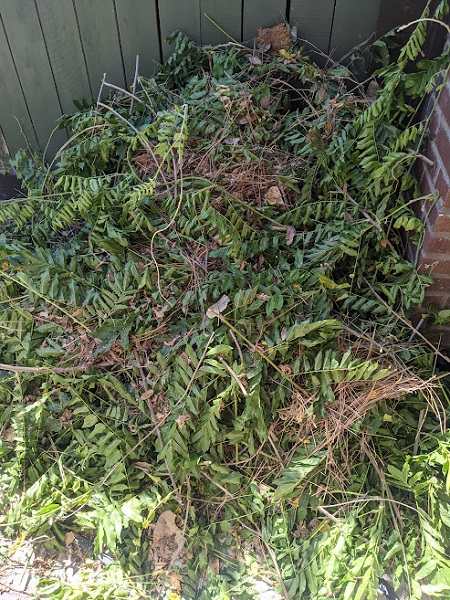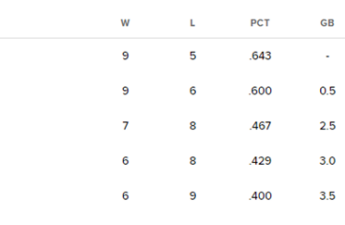When I was a young child in Visalia, in California’s Central Valley, we had a wisteria vine growing in the side yard. It would grow uncontrollably in spring and summer, sprouting thin green tendrils seemingly overnight and looping them around walls, attaching to fences, grabbing hold of the underside of eaves never to let go. Sometimes it would entwine its many shoots around a nearby tree branch, tying around itself in an effort to seemingly strangle or even replace the thicker wood. I was fascinated by the idea that a plant could transform itself so quickly, could seem to feel around its environment and latch on.
I spent much of the morning on Friday clipping the wisteria atop my parents’ (now just mother’s) roof in Albuquerque, New Mexico. Rooted in a patch of dirt cut out from the cement side yard, the wisteria has grown in recent years to ensnare the latticework built to accommodate it, but also threatens to weigh down a suspended power line that dangles precariously from a taut hold on the roof to a loose attachment to a far-flung pole. This makes clipping it a treacherous task. While new green shoots are easily discerned from the black and silver of a power line, the more aged stems are brown and stockier, making potential confusion more likely. The work was slow and methodical, though ultimately quite satisfying. Like the painting I’d done the day before, progress steadily altered the landscape from something uneven and messy to something more ordered and neat.
It is perhaps this type of process that my father found so fulfilling when he said he loved working with his hands. I could never understand that he meant it more literally, that he took pleasure from the process of applying his own direct manipulation to his environment, sweating and toiling under a close-set sun while his hands nestled boards into place, glued down tiles, or grouted bricks. Maybe I’ve just known too many cross-country runners who heralded their sport only by talking about how great it felt to stop doing it. Or maybe I’m too familiar with my own proclivities, my overwhelming tendency to feel viscerally annoyed by most manual labor. Repeatedly in any physical task, I magnify a minor frustration into a full-blown near-rage, having to walk away and throw my hands out in anger, often grunting or muttering to myself. I’ve never quite understood why or how this happens – it’s unique to sweaty manual labor, absent when playing sports or walking, regardless of the heat. Some of it must come from not feeling very skilled at my task, but even when I am making steady progress or surprising myself at my pace, the temper boils and bubbles below and eventually above the surface. I can describe it as my patience and tolerance burning down to the quick at an unprecedented pace, but I can’t explain it.
So much of this, my dissatisfaction with manual labor, kept me apart from my dad in one of his great loves, a love he hoped so desperately to instill in me. Of course there’s an irony he’d deeply appreciate in me spending so much time in the past two weeks following in his footsteps, reluctantly embracing his craft to ensure his work is maintained and preserved through at least another winter to come. He had good tools and plenty of them, and I’ve come to appreciate the eye he had for gloves, adhesives, hammers, clippers, and screwdrivers. Little guidances intoned to me in the assumption that I’d one day become a builder rang in my ears, bringing a soft smile to my lips for the first time, replacing hardened scowls of resistance so frequently delivered to his imploring face. Use leverage. The further down you hold the clippers, the more power you have. On the roof, anticipate where you would fall and adjust your weight accordingly. It is hard to make yourself fall backwards, but much safer to do so.
I slowly scooted my way along the roof’s edge, sometimes dangling a foot to rest, near-weightless, on the lattice. Clip, clip, clip. Then chucking loose fronds of leafy stem, at first to the side, then over my head with some torque to propel them as I got further from the edge where I’d eventually sweep them all down. Perilously closer to the power line, working slower now, one snip at a time and then carefully untangling the severed piece from its twirled neighbors, be they other parts of plant, charged wires, or stray pine needles grown crispy brown.
After two hours in the burgeoning sun of a day that would hit 104 in this neighborhood (only 103 officially at the airport, still breaking an all-time record that dates back to my birth year of 1980), I could feel the salt seeping from my forehead, down my nose, and onto my lips and tongue as I panted. Days-old mosquito bites mixed with new redness to make my arms pulse with a faint mix of itchiness. But I could see a clean line where the wisteria ended and the roof began. A line that would hold for now, that would last at least a few weeks or months before the thin exploratory protrusions renewed their chlorophyll-fueled quest for purchase.
Left to its own devices, nature would eventually reclaim this house. The wisteria would tie itself in unbreakable knots around each board and brick, loosening and buckling and eroding. The dust would pile up against the walls, slowly transforming to dirt and allowing insects and animals to inhabit the space, eventually burrowing and wending their way in. The relentless New Mexico sol would bore its way into the surfaces, cracking and peeling and mixing with the occasional downpour to spread decay.
To own or work on a home is to steward it against nature. Against the forces of weather and time and life that seek to equalize it with the surrounding land. The pace of nature is, usually, sufficiently slow that we see this as an unfair fight, one in which we can take our time to methodically renew and bolster our structures against whatever the world would throw at it. But the process, even in the good, slow times, takes vigilance and dedication. Constant vigilance! my dad used to implore. It informed the way he worked on the house and the way he lived his life. He said it with a playful smile in his eyes, but a hard set in his jaw.
This is the first post in the One Thing series.
See the project’s Announcement and Rules here.



